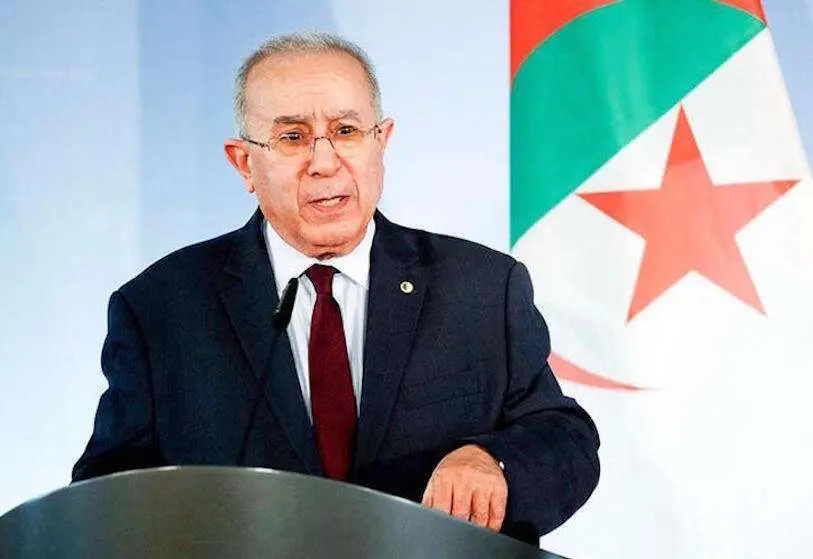Argelia ahoga la crisis interna a costa de la ruptura de relaciones diplomáticas con Marruecos

The Algerian government has resolved to break off diplomatic relations with Morocco, "because of the hostile acts carried out by the latter and which persist to this day", the Minister of Foreign Affairs, Ratmane Lamamra, declared today. Without any evidence shown, the Algiers government has accused its Moroccan neighbor of having provoked the deadly fires that have ravaged several regions of the country and in particular Kabylia, and of supporting the self-styled Movement for Self-Determination of Kabylia (MAK), which Algiers labels as terrorist.
Curiously, the trial of more than 90 persons implicated in the murder of the young Algerian Ben Smail, lynched by a mob manipulated by members of the police services, as denounced by Algerie Part, began yesterday in the Algiers Court, but it has not yet pronounced itself on the subject. The government already takes for granted its thesis that Morocco is behind the fires and the assassination of Ben Smail, without waiting for the verdict.

The step taken by the Algerian power augurs an uncertain future for the Maghreb. Attempts by major international mediators, such as Saudi Arabia and the United States, as well as France, to bring the two North African geopolitical rivals closer together have been in vain.
The Algerian reaction, considered desperate in some circles, comes after the "operation" mounted by the Algerian services to put pressure on the pro-Algerian Hispanic lobby to admit the Polisario Front leader Brahim Ghali in a hospital in Logroño, has ended in failure. King Mohamed VI himself, in his speech of August 20 last, considered that every cloud has a silver lining, and he pronounced himself in favor of a new, more audacious and novel relationship with Spain.
From the crisis experienced in recent weeks between Morocco and Spain, which encompasses the entire area of the Strait of Gibraltar, the Alaouite Kingdom has clearly come out on top. Not only has it received the repeated support of the US Administration, the CIA and the Pentagon, but it has also gained new partners, such as Israel - by establishing relations with its State -, Great Britain, with whom it will carry out military maneuvers this year, Portugal, with whom it has launched ambitious transport and communications projects, and Gibraltar, with whom it is negotiating major political-financial agreements.
The Spanish government of Pedro Sanchez, although absent from the new strategic reformulation in the Strait of Gibraltar, has signed up in extremis to the change and promises to live up to the new relations offered by Rabat.

The loser in the West-Mediterranean equation is Algeria, which has been left with its only permanent ally, Russia, which is eager to enter the strategic game in the Strait. However, Algiers still holds important leverage cards, largely with its hydrocarbons, which are becoming less and less profitable, as demonstrated by the pressure exerted against the Spanish government, first with the Ghali case, and a few days ago with the case of Mohamed Abdallah.
The youtuber Mohamed Abdallah, former member of the Algerian Gendarmerie, known for his denunciations of corruption in the Algerian-Tunisian border security where he was stationed, has been handed over to the Algerian authorities, denying him the request for political asylum that he had requested at the time in Spain. And this, even though he knows that in Algiers he will be subjected to a trial by a military court, in which he risks the death penalty. The Spanish Ministry of the Interior put him in a package of "illegal immigrants" whose permits to stay in the country had run out, and sent him to Algeria, contrary to all the rules of international law on refuge and asylum.
The case of Mohamed Abdallah has not yet been concluded. Algiers requested his extradition, accusing him of belonging to an Islamist and terrorist group, and of attacking the security of the State. In a country where three former prime ministers and more than fifteen other ministers are in prison, along with some twenty generals and the cream of the Algerian business class, accused of corruption, the surrender of young Abdellah to Algiers has shown the shame of the Spanish government and has shaken the human rights media.
The Rachad movement to which the young Mohamed Abdallah supposedly belongs, is neither Islamist nor terrorist; it militates for the peaceful transformation of the country, with political means, according to its statutes, as declared to ATALAYAR by the lawyer Rachid Mesli, who directs an international organization for the defense of human rights based in Geneva, and recognized by the corresponding bodies of the United Nations.











